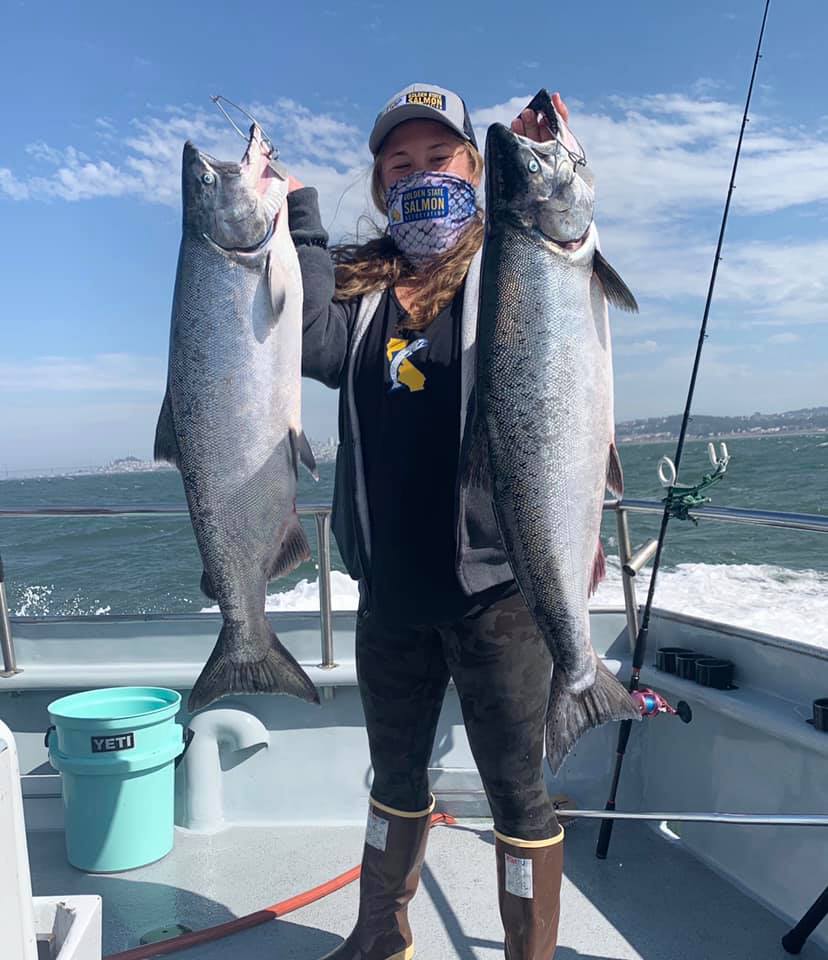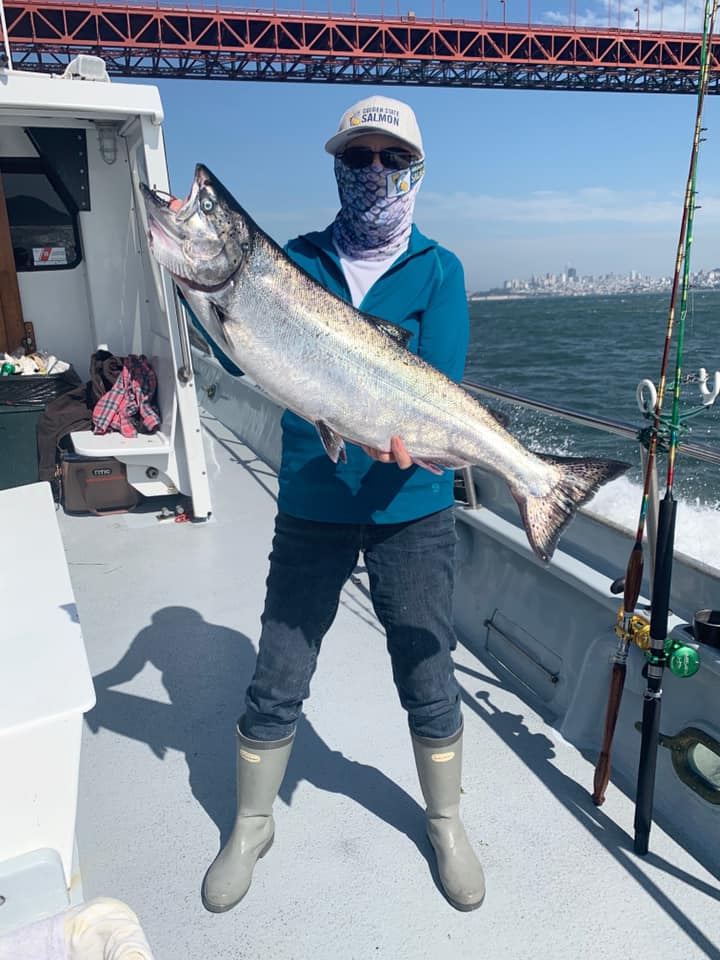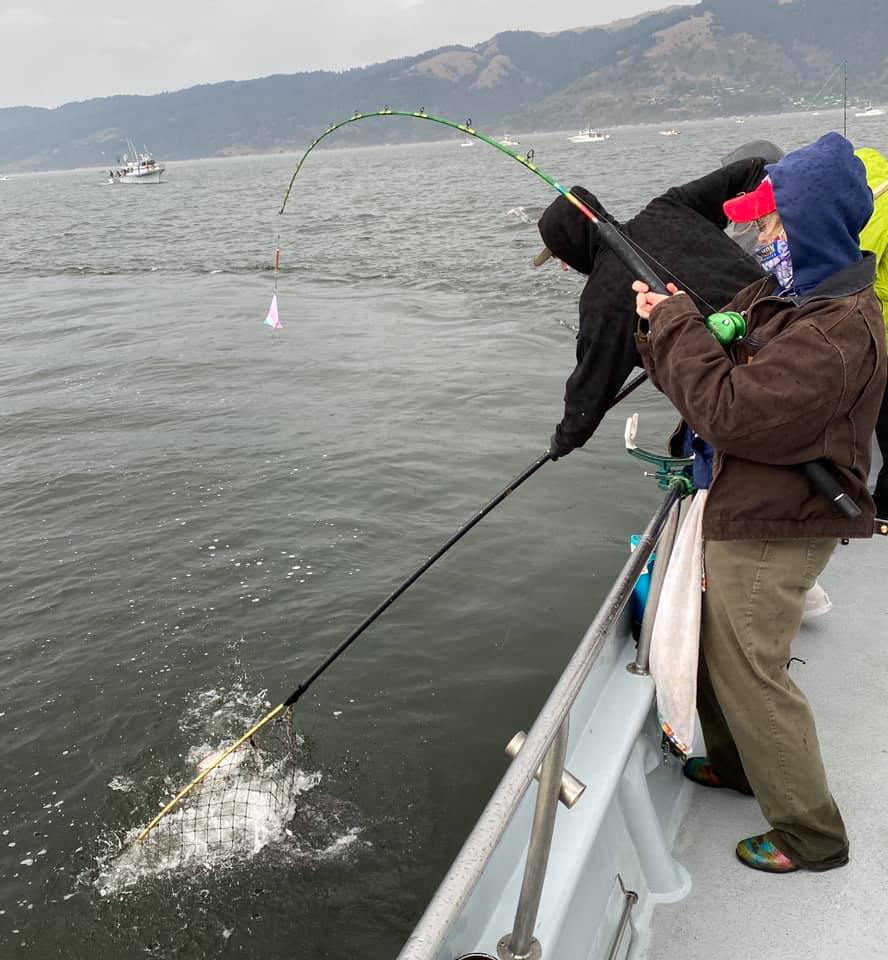
The Golden State Salmon Association’s “Fish Like A Girl” charter group went outside the Golden Gate in pursuit of Chinook salmon on Sunday, August 16 – and experienced some of the wildest weather that they, the captain and the deckhand, had ever seen while fishing.
“The morning started out with thunder, lightning and rain. Then the weather switched from a warm, hot wind, to a heavy, cold wind, to more rain, to sunshine,” said Cat Kaiser, GSSA Fundraising and Events Coordinator.
They spent their day fishing off Stinson Beach along the Marin County Coast. “In spite of the crazy weather, the seas were flat except for the wind,” she said. “It was quite pleasant. We had mimosas and brunch and all had brought something to share.”
The 14 anglers caught a total of 15 salmon. Most of the fish were over 15 pounds.
“The day started off with Linda Vaio catching her first fish, a 10 pounder, on the portside of the boat,” said Kaiser. “Four girls who had never been fishing or caught a salmon before landed fish.”
The captain, Jared Davis, started the day trolling over 65 feet of water. The anglers trolled anchovies anywhere from 30 to 45 feet deep.
Darien Corey of Fairfield, who had never been fishing before, landed two shiny salmon weighing 20 pounds each. Another angler, Samantha, also bagged her first-ever salmon. Crystal Smith of Novato took the day’s jackpot with a 24 lb. Chinook.
“Our group today fished like a bunch of girls … and that’s a very good thing,” Captain Davis said. “Nothing could stop them — they turned some wild weather this morning and a ‘gotta work for it” bite into one for the books — and a fish per rod day that will be remembered for years to come.”
“Limits of smiles, fun, love and support for their sisters made for a truly epic experience – and they put 15 salmon in the box to boot,” he said.
Deckhand Tommy Watson also commented that no fish were lost or dropped during the trip.
“All of these girls are now new friends,” Kaiser said. “Two girls were celebrating a birthday and one a retirement.”
“Seeing four women catching their first salmon is what these trips are all about. Getting more women involved in fishing is a beautiful thing,” concluded Kaiser.
This year was the third one that GSSA has sponsored the very popular “Fish Like a Girl” trips on the Salty Lady.
The National Marine Fisheries Service’s 2020 ocean abundance projection for Sacramento River fall Chinook salmon was 473,200 adult fish. This indicates that we should see large numbers of fish migrate back into the Sacramento, American, Feather, and Mokelumne rivers this fall. Last year, we saw solid salmon fishing outside the Golden Gate, particularly off the Marin County Coast, until the end of the salmon season. Hopefully, the same will take place this year.
This has been a good year so far for salmon off the California Coast from Bodega Bay to Monterey, but the most consistent fishing has been off the Marin County Coast from Stinson Beach north.

In 2019, Approximately 272,000 salmon were harvested in the commercial fishery and 88,500 were harvested in the recreational ocean fishery, according to data collected by the California Department of Fish and Wildlife (CDFW.
John McManus, GSSA President, noted that ocean fishermen and women are seeing a good number of small salmon in the ocean, even into the late summer, pointing to a good season next year.
‘These appear to be two year old fish which would be expected to return to Central Valley rivers as adults next year,” stated McManus. “Assuming they are next year’s fish, we should be looking at another decent fishing season. These fish were born in late 2018 and exited the Central Valley and the Bay in the spring of 2019 when we had good runoff from a wet winter and spring. So we’d expect to see a good number survive.”
“Runoff this past spring of 2020 wasn’t very good, which will affect what kind of fishing we’ll have in 2022. The silver lining is the move of more hatchery releases west in the bay that has provided the equivalent of adding a new hatchery in terms of number of fish that survive to adulthood.,” said McManus.
The Golden State Salmon Association (GSSA) is a coalition of salmon advocates that includes commercial and recreational salmon fishermen and women, businesses, restaurants, a native tribe, environmentalists, elected officials, families and communities that rely on salmon. GSSA’s mission is to “restore California salmon for their economic, recreational, commercial, environmental, cultural and health values.”
A big victory for GSSA: Federal court rules that Reclamation water plan must limit pumping
One of the GSSA’s biggest victories for salmon this year took place on May 1 when a federal court ruled that a federal Bureau of Reclamation water diversion and pumping plan, deadly to salmon and other wildlife in the Central Valley, must restrict pumping.
“The ruling comes in two cases, one brought by GSSA and allied groups and one brought by the state of California. Both seek to overturn excessive water diversions by the Bureau of Reclamation because of the extreme environmental damage they are causing,” said McManus.
The ruling resolves a portion of a motion for a preliminary injunction that GSSA and allies filed on March 5. In the order, the court directed the federal Bureau of Reclamation to reinstate a restriction on South Delta pumping that is more protective of fish populations, including juvenile salmon and steelhead through May 31 when the more protective rule would annually expire. Baby steelhead and salmon are currently migrating through the Delta, according to McManus.
“This is a major victory for salmon fishing families, California’s environment, and the coastal and inland communities that depend on salmon to survive,” said McManus. “The federal Bureau of Reclamation, under Interior Secretary David Bernhardt, is trying to drain Northern California salmon rivers and the Delta in violation of the law, at great cost to California’s salmon runs, and our court case is putting a brake on those efforts.”
McManus said the federal plan allows boosted water diversions from salmon rivers in northern California and the Delta by 600,000 acre feet at a time when the state and multiple scientific agencies documented the need to reduce such diversions and leave more water in the rivers to maintain salmon and other native wildlife.
Last July the National Marine Fisheries Service (NMFS) scientists rejected the pumping and diversion plan because of the harm it would do to salmon and other wildlife. Later, under pressure from the Trump administration, NMFS reversed course and approved it in a biological opinion, or BiOp, according to McManus.
“The fishing and conservation groups presented evidence to the court that the lax federal water rules illegally ignored established science demonstrating that protected fish populations have been precipitously declining, that federal water project operations have significant, adverse effects on these imperiled populations, and that existing protections need to be increased to avoid further jeopardizing the species. Even though federal fish and wildlife agencies until recently supported the science, they arbitrarily flip flopped, a reversal noted by the court,” said McManus.
“The federal government is trying to drain northern California’s salmon rivers in order to transfer water to the dry western San Joaquin Valley,” said GSSA Secretary Dick Pool. “This is a violation of the law, at great cost to our salmon runs.”
For more information about the Golden State Salmon Association, go to goldenstatesalmon.org or call 855-251-GGSA (4472).

Marin Coast Facts
Salmon Regulations: The season from Point Arena to Pigeon Point (San Francisco) is from May 1 – November1 8. Minimum size limit: 20 inches total length. Daily bag limit: 2 salmon of any species except coho (silver) salmon. Possession limit: No more than two daily bag limits may be possessed when on land. On a vessel in ocean waters, no person shall possess or bring ashore more than one daily bag limit. Retention of coho (silver) salmon or steelhead trout is prohibited in any ocean fishery.
Rockfish Regulations: The recreational fishery for rockfish (Sebastes sp.) is open to divers and shore-based anglers year-round. This fishery is open to boat-based anglers from April 1, 2020 through December 31, 2020. These species may only be taken or possessed in waters less than 240 feet (40 fathoms) deep. The daily bag and possession limit is 10 fish in combination of all species within the RCG Complex (includes all species of Rockfish, Cabezon and Greenlings) per person, with a sub-limit on black rockfish (4 per person), canary rockfish (3 per person) and cabezon (3 per person) also included in the 10 fish RCG Complex aggregate limit. Yelloweye rockfish, bronzespotted rockfish, and cowcod may not be retained (bag limit: zero).
Lingcod Regulations: The recreational fishery for lingcod (Ophiodon elongatus) is open to divers and shore-based anglers year-round. This fishery is open to boat-based anglers from April 1, 2020 through December 31, 2020. Lingcod may only be taken or possessed in waters less than 240 ft (40 fm) deep. The daily bag and possession limit is 2 fish, with a minimum size limit of 22 inches total length.
Other Species: Fishing for halibut, striped bass and leopard sharks is open year round in San Francisco Bay and outside of the Golden Gate. The bag limit for striped bass is two fish 18 inches or over; halibut, three fish over 22 inches; and leopard sharks, 3 fish over 36 inches. There are seasonal closures for salmon, sturgeon and soupfin sharks in San Francisco Bay.
Charter Boats: Sportfishing boats from throughout the Bay Area target kings salmon, rockfish, lingcod, halibut and striped bass on San Francisco Bay and outside of the Golden Gate during their respective seasons. Contact Captain James Smith of the California Dawn, (510) 417-5557. Other boats booking trips out of the Berkeley Marina include the; New Easy Rider, (707) 422-2050; Pacific Dream, (510) 993-4414; Happy Hooker, ((510) 223-5388; Hook’d Up Sportfishing, (707) 655-6736; Goldeneye 2000, (510) 610-0888, or Bay Charter Boats, 510-850-2285 or cell 510-672-6913, For more information, call the Berkeley Marina Sportfishing Center, (510) 849-3333.The New Huck Finn, Sundance, Superfish, C-Gull II, New Seeker, New Salmon Queen, Sea Wolf and Wet Spot depart from the Emeryville Sportfishing Center, (510) 654-6040.The Bass Tub, (415) 456-9055, and Silver Fox Sportfishing, (415) 367-5600, depart from Fisherman’s Wharf in San Francisco, while the Predator, (707) 342-8481, is berthed at the Vallejo Marina. The Salty Ladu. (415) 548-0150, is berthed out of Sausalito.

